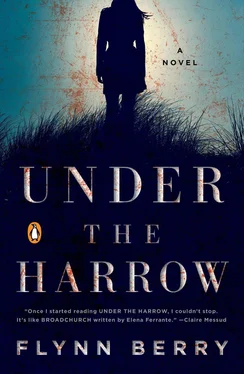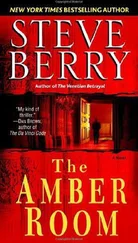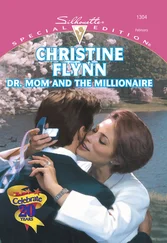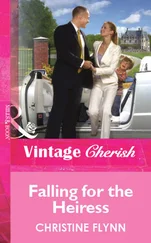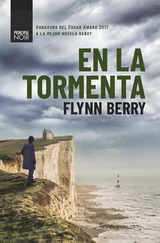The bell over the newsagent’s door peals and I look up. I wait for a moment, and then I lift my hand to wave.
Keith unties his dog’s lead and crosses the road toward me. His shadow spills over the table and I look up at him, shading my eyes with my hand. He wears the same coat as on the aqueduct, but open, with a work shirt underneath. He is solid and tall but soft at the middle.
“Hello,” I say. I fold the newspaper and stow it on the bench beside me.
“Are they treating you well?” he asks, pointing at the inn.
“Yes.”
He nods. The silence stretches and I slip my hand inside the paper for comfort. The sound of a sledgehammer comes from behind the inn, and Keith says, “They’ve been repairing that road for weeks.”
The dog rests her front paws on my lap, and I scratch behind her ears. She presses her head against my chest. Keith says, “Nice to see you again. If there’s anything we can do.” He steps back, pulling on the dog’s lead so she drops from the bench and out of my reach.
“Actually,” I say, and he stops. “I’ve just had a phone call. The police are done with Rachel’s car. It’s at a place in Didcot, and there aren’t any buses to it.”
He stares at me as though he doesn’t understand. I wait, and then he says, “Not a problem. I can take you now if you like.”
In my room, I pack the carving knife, wrapped in a leather glove, and a can of pepper spray. On my way out the door, I tell the manager that Keith Denton is giving me a lift to Didcot. She smiles and says, “How nice of him.”
Keith arrives in a black Renault. “Not the van,” I say as I climb in.
“Only for jobs. It uses too much fuel.”
I grip the can of pepper spray in my pocket. Both of his hands hold the wheel. I expected to be scared but instead I’m filled with anticipation, and a rising sense of power. He’s nervous.
We drive through Marlow. The door next to me is unlocked, and I roll the window down. The day is bright, and he doesn’t comment on the cold draft. He asks if we have any family in the area, and I say no. He switches on the radio. I direct him onto the motorway. As he pulls onto the slip road, I say, “It must be especially difficult for you.”
“Why?”
“You saw her right before it happened.”
His hands roll forward on the wheel, then back. If you did it, I think, I will destroy you. He leans from his seat, checking the next lane with exaggerated care before merging.
He doesn’t speak for a long time, and then he says, “He might have already been there, waiting for me to leave. I should have noticed.”
“This is the exit,” I say. We drive past a parade of shops, a shipping depot, a storage facility. He drives slowly, checking the numbers on the side of the road. There isn’t any foot traffic and for the first time since we left I’m frightened.
“Here.”
He pulls into the lot, where a guard sits in a booth at the entrance. Keith passes my license through the window to him, and we wait in silence as he searches for my record. Keith appears restless, and I wonder if he came here to collect his van after it was tested for her blood.
The guard returns my license and the gate swings open. Keith starts driving down the first row. I scan the cars, and then he stops. I look past him at Rachel’s car, an old Jeep. He turns to me with his mouth compressed in a tight smile, waiting for me to go.
“Thank you. Are you hungry?” I ask. “Can I take you someplace?”
We agree to meet at the Duck and Cover. After he leaves, I lock her car around me. The interior smells familiar, warm and dusty. I open the glove box and take out a small gold tube of lipstick. The color, when I open it, is a vivid dark red.
She had so much left to do. It isn’t that she had something grand in mind, at least not that I know of. It is worse than that, she has been taken away from everything, she lost everything. She likes red lipstick, and will never again stand in the aisle at a chemist’s, testing the shades on the back of her hand. She likes films, and will miss all the ones coming out at the holidays that she planned to see. She likes pan con tomate, and will never again come home from work and mash tomatoes and garlic and olive oil, and rub it onto grilled bread, and eat it standing in her kitchen.
• • •
At the Duck and Cover, Keith orders a whisky. The disappointment makes me slump. They carry Tennent’s, the same green cans of lager as the ones on the ridge.
“Miss?”
“A Tennent’s, please.” I point at the can. Keith doesn’t react. The bartender sets down our drinks and leans against the bar with his back to us, arms folded, watching greyhounds pelt down a track.
“Do you usually drink whisky in the daytime?” I ask.
“No,” says Keith, watching the dogs.
“What’s your usual?” I say it loudly, hoping the bartender will correct him if he lies.
“I don’t have one.”
The greyhounds disappear into mist. The race ends, and a photograph shows the distance between the front two dogs’ noses and the finish line. Their noses are very long, like horses’.
“Anything to eat?” asks the bartender.
“I’m not hungry,” says Keith.
“No, me neither.”
The bartender takes a pack of Benson and Hedges from a shelf and goes onto the back patio, leaving the door cracked open. If I shout, he will come back inside. I don’t know which of the two men would be stronger. I swallow a long draft of beer and wish it were whisky.
“You were eager to help,” I say.
Keith doesn’t straighten or look at me, but something in him tenses and flexes.
“Rachel was lovely. She was a lovely woman.”
“Did you fancy her?”
“I’m married.” I shrug. He says, “No, it’s not like that.”
“What was it like?”
“With Tash? It’s good. It’s normal.”
“No, with Rachel.”
He sets down his whisky and I think he’s going to hit me. “I barely knew her.”
Nothing happens, but I am sure he wanted to strike me. “I didn’t tell you when to stop,” I say, and he watches me. “How did you know which car was hers?”
“I’d just done a job at her house.”
“Rachel told me you were obsessed with her.”
He puts a note on the bar and leaves. I can’t tell if it was the right thing to say. She never mentioned him.
MORETTI CALLS. “We’re done with the house. Let me give you the number of a cleaning agency.”
“You don’t handle that?”
“No.”
“Do you pay for it?”
“No.”
“We don’t have to clean it. If it will compromise evidence—”
“We have what we need,” he says, and I take down the number. The agency is called Combe Cleaners. You wouldn’t know their specialty unless you asked. “You’ll want to have the cleaners in before you go back,” he says. “We can arrange for people to be at the house when you arrive, light a fire, make sure the boiler is on. Some families like to have a priest bless the house. Should I arrange anything like that?”
“What people?”
“Friends of yours and Rachel’s.”
“Oh.” I thought he meant strangers, or guards, which I would have preferred. “No, thank you.”
• • •
I decide not to wait for the cleaners.
A few yellow leaves hang from the elms on either side of Rachel’s house. Some noise flushes the birds from the trees and they wheel into the sky. The air smells of water and mud and hay and the smokiness that courses over the countryside in November. Across the road, Rachel’s neighbor rides in her paddock on the same dappled horse as on the day Rachel was killed.
Smoke rises from the chimney at the professor’s house. Two cars are parked in its open barn. Wind flattens the thorn trees on top of the ridge and bends the column of smoke until it is almost horizontal.
Читать дальше
